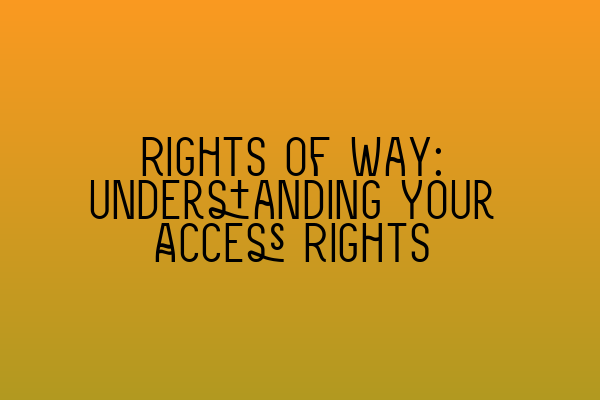Rights of Way: Understanding Your Access Rights
When it comes to property ownership, understanding your rights and limitations is crucial. One important aspect to consider is the rights of way, which grant individuals the legal right to cross another person’s property. In this article, we will delve into the details of rights of way, explaining what they are, how they are created, and how they can be protected.
Before we dive into the intricacies of rights of way, we invite you to check out these related articles to expand your knowledge:
- Understanding Contractual Capacity: Rights and Limitations
- Interactive SQE Mock Tests for Contract Law: Test Your Knowledge
- Join Our SQE Contract Law Webinars: Expert Insights and Guidance
- Contract Law Reforms: An Analysis of Recent Changes
- Parties in a Contract: Rights and Responsibilities
What are Rights of Way?
In simple terms, a right of way is a legal right that allows someone to pass through someone else’s property. It provides access to land for the benefit of the owner of the right of way, and it can be granted to individuals or to multiple properties.
Rights of way can be essential for properties that are landlocked or have limited access to public roads. They can also be useful for accessing public spaces, such as beaches or parks.
How are Rights of Way Created?
Rights of way can be created in various ways, including:
- Express grant: A right of way can be explicitly granted in a legal document, such as a deed or contract. This document will outline the rights, limitations, and any associated rules for the right of way.
- Prior use: If a specific path has been used by individuals for a long period of time without any objections from the property owner, it may be recognized as a legal right of way through a legal doctrine called prescription by common law. However, the usage needs to be continuous and without interruption.
- Implied grant: In some circumstances, a right of way can be implied based on the surrounding circumstances. For example, if a property is sold and it is the only means of access to a public road, it can be inferred that a right of way is granted.
Protecting Rights of Way
Once a right of way is established, it is important to take measures to protect it:
- Register the right of way: To ensure the legal recognition and protection of a right of way, it is advisable to register it with the Land Registry. This will make it easier to prove the existence of the right in case of any disputes.
- Maintain the right of way: It is crucial to keep the right of way clear and in good condition. Failure to do so may lead to claims of abandonment or non-use, which could jeopardize the right.
- Respect neighboring properties: It is important to use the right of way responsibly and considerately, ensuring minimal disruption to neighboring properties.
In conclusion, rights of way can be valuable assets for property owners, providing essential access to their land or public spaces. Understanding how rights of way are created and taking steps to protect them is essential to ensure their continued use and enjoyment.
If you have any questions regarding rights of way or other property law matters, do not hesitate to reach out to our team at SQE Property Law & Land Law.
